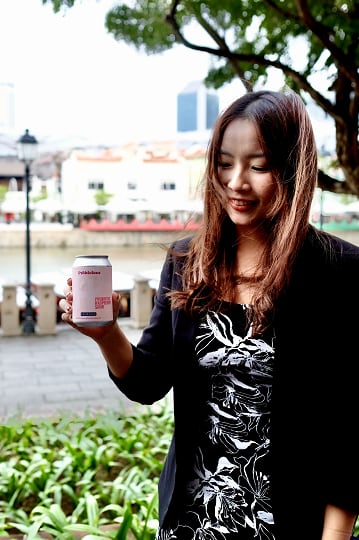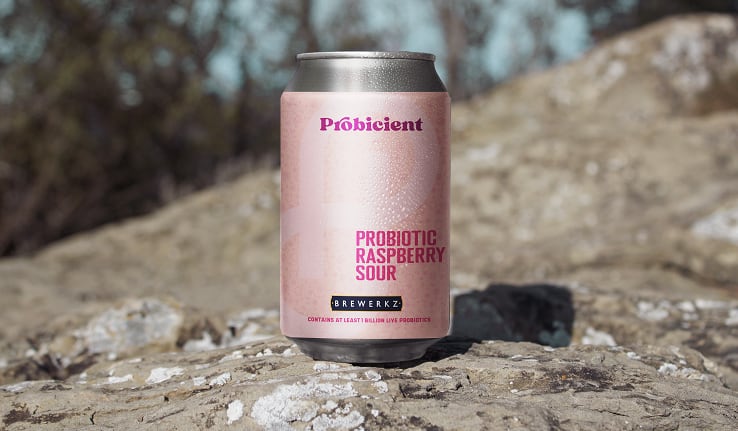Containing one billion of Lactobacillus paracasei L26 per serving, the beer, which contains 4.5 per cent alcohol by volume (ABV), is available in all Brewerkz outlets on tap since March 1.
It is sold as ‘Red Billion Probiotic Raspberry Sour Beer’ in the outlets.
Said to promote gut health and enhance microbiome activity in the gut, the beer needs to be refrigerated at below five degree Celsius to keep the probiotics alive for its benefits to take effect in the gut.
Brewerkz will be adding new probiotic beer flavours, with plans to canning and retailing them in supermarket chains and online channels further down the road.
The concept of the probiotic beer first sparked public interest when it was announced in 2017.
Back then, Alcine Chan, a student from NUS’ Food Science and Technology Programme (FST) managed to develop a technique that allow at least one billion live probiotics in per serving of beer with associate professor Liu Shao Quan.
Live bacteria count is of importance as it determines if a product could be qualified as a probiotic.
According to the International Scientific Association for Probiotics and Prebiotics (ISAPP), a product can only be considered a probiotic when it contains at least one billion colony forming units (CFU) of live bacteria.
Today, almost five years later, the concept is successfully commercialised by local start-up Probicient – a spin-off between NUSFST and private equity angel firm Origgin Ventures.
Probicient is currently an eight-person team, with Chan, who is currently pursuing her Ph.D in NUS, the co-founder and scientist. Prof Liu is also the co-founder and plays the role of the technical lead at the start-up.
To date, the project has received SGD$1.5m investment from the government and Origgin Ventures.
Origgin Ventures has also invested in a number of start-ups, such as NuSpace, Soyenergy, Sgnaplus, Squareroot8.
A ‘grown-up’ Yakult
Speaking to NutraIngredients-Asia, CEO of Probicient, Claire Huang, said the probiotic beer was akin to a grown-up version of Yakult.

“Yakult contains a particular strain, in a particular format – it is a dairy-based product. What we are doing here is introducing the benefits of probiotics through a drink that is non-dairy and is in an ‘adult’ format for social drinking.
“This is like a ‘grown-up’ Yakult that is non-dairy.
“This probiotic beer is like a first-in-the-world, what Origgin sees is in the value of this untapped market,” said Huang, who is also a venture creator under Origgin.
In fact, she said that some local breweries have tried to come up with its own probiotic beer, but efforts were in vain due to the technical challenges.
“The breweries are excited about possibilities around probiotic beer. Some micro-breweries told us they have tried doing it but were not successful.
“Now that we have developed the technology to do it and also came up with other prototypes, such as the ambient version, this gives us the value to come into the scene as an innovation provider.”
One of the technical challenges was to ensure that the probiotics remained ‘live’ during the production process, said Huang.
Clinical trial on beer
A human clinical trial is underway to prove the benefits of the probiotic beer in humans.
Preliminary findings of the trial showed that drinking of the probiotic beer could significantly increase the richness of the gut microbiota and key index of cytokines related to the immune system.
Thirty subjects were involved in the randomised, controlled, crossover trial.
Each subject drank either a can of the probiotic or control beer for two weeks, then entered into a one-week washout period, before drinking a different product for another two weeks.
Blood and stool samples are taken from the subjects before and after each phase of the trial to measure the changes in their gut microbiome.
The trial started in last July and is expected to end in April.
NPD plans
Probicient is also setting its sights on other alcoholic probiotic products, including probiotic sake, probiotic seltzer etc.
“The research team which we work with at NUS specialises in fermentation techniques, and so, we are not just limited to beer, we are also able to adapt the research to other areas in the alcohol space.
“Beer is not going to be the end-game but is just the start of the probiotic alcohol category. We will also look at trends such as no-to-low alcohol and other functional benefits that we can add to alcohol,” Huang said.
There are also plans for introducing other nutrients, such as vitamins-fortified alcoholic products.
Aside from Brewerkz, it has also identified two other brewery partners, including The 1925 Brewing Co. – which owns the restaurant Blue Smoke – and Lion Brewery Co for probiotic beers in new flavours.
In bars and restaurants, the probiotic beers could be introduced to consumers by including it in a healthy food menu or through outlet staff who are educated on its benefits.
“For our phase one plan, we are looking to be a technology enabler by either working with breweries through technology licensing or coming out with a collaboration brew…The technology still remains exclusively available to our company,” she said.


